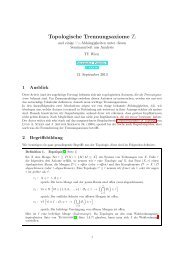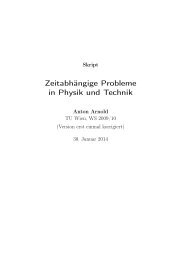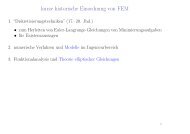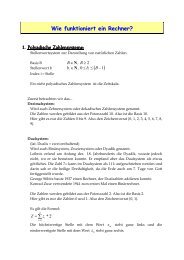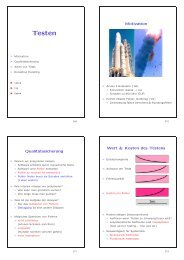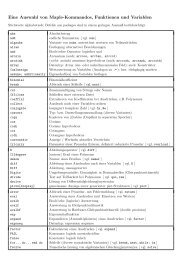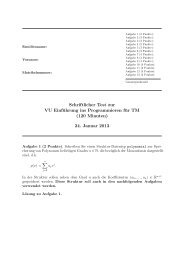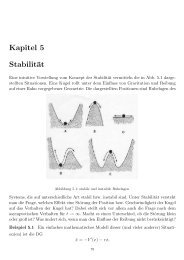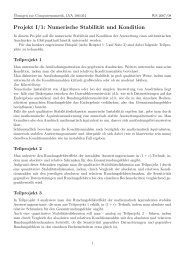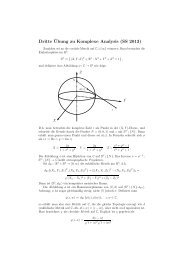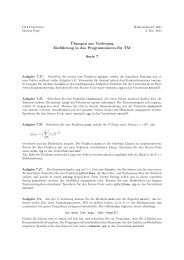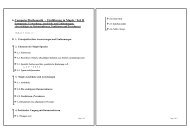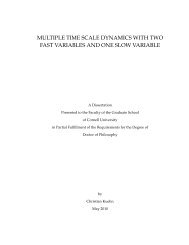- Seite 1:
Klaus Schmaranz Softwareentwicklung
- Seite 4 und 5:
VI Vorwort des Autors Es ist das vo
- Seite 6 und 7:
VIII Vorwort des Autors Last, but n
- Seite 8 und 9:
X Inhaltsverzeichnis 4. Kontrollstr
- Seite 10 und 11:
XII Inhaltsverzeichnis 11. Exceptio
- Seite 13 und 14:
1. Ziel und Inhalt dieses Buchs Die
- Seite 15 und 16:
1.1 Zum Inhalt 3 z.B. bei Abhandlun
- Seite 17 und 18:
1.1 Zum Inhalt 5 stiegspunkte hat,
- Seite 19 und 20:
1.2 Motivation 7 über die Hälfte
- Seite 21:
1.4 Die beiliegende CD-ROM 9 Ich w
- Seite 25 und 26:
2. Datentypen und Variablen Die Ver
- Seite 27 und 28:
2.1 Primitive Datentypen 15 Wenn ma
- Seite 29 und 30:
2.1 Primitive Datentypen 17 hat man
- Seite 31 und 32:
2.1 Primitive Datentypen 19 Leser,
- Seite 33 und 34:
2.2 Deklaration, Definition und Ini
- Seite 35 und 36:
2.2 Deklaration, Definition und Ini
- Seite 37 und 38:
2.3 Das erste C++ Programm 25 Prinz
- Seite 39 und 40:
a g l o b a l v a r : 1 7 a n o t h
- Seite 41 und 42:
2.3 Das erste C++ Programm 29 • Z
- Seite 43 und 44:
2.4 Zusammengesetzte Datentypen 2.4
- Seite 45 und 46:
26 cout
- Seite 47 und 48:
2.4 Zusammengesetzte Datentypen 35
- Seite 49 und 50:
2.4 Zusammengesetzte Datentypen 37
- Seite 51 und 52:
2.4 Zusammengesetzte Datentypen 39
- Seite 53 und 54:
2.4 Zusammengesetzte Datentypen 41
- Seite 55 und 56:
2.4 Zusammengesetzte Datentypen 43
- Seite 57 und 58:
25 // of the anonymous union 26 num
- Seite 59 und 60:
2.6 Symbolische Konstanten 47 Ich m
- Seite 61 und 62:
2.7 Eigene Typdefinitionen 49 1. Ko
- Seite 63:
2.7 Eigene Typdefinitionen 51 Um ü
- Seite 66 und 67:
54 3. Operatoren kann auch durch Op
- Seite 68 und 69:
56 3. Operatoren Rang Bedeutung Ope
- Seite 70 und 71:
58 3. Operatoren Bis auf den “mod
- Seite 72 und 73:
60 3. Operatoren Definition, dass 0
- Seite 74 und 75:
62 3. Operatoren die Umwandlung in
- Seite 76 und 77:
64 3. Operatoren 46 typeid ( long l
- Seite 78 und 79:
66 3. Operatoren Was sieht man an u
- Seite 80 und 81:
68 3. Operatoren Zahl als int und a
- Seite 82 und 83:
70 3. Operatoren primitive Datentyp
- Seite 84 und 85:
72 3. Operatoren Wieso eigentlich k
- Seite 86 und 87:
74 4. Kontrollstrukturen 4.1 Select
- Seite 88 und 89:
76 4. Kontrollstrukturen Ich habe h
- Seite 90 und 91:
78 4. Kontrollstrukturen 8 using st
- Seite 92 und 93:
80 4. Kontrollstrukturen Im Gegensa
- Seite 94 und 95:
82 4. Kontrollstrukturen 23 cout
- Seite 97 und 98:
5. Funktionen Prinzipiell ist eine
- Seite 99 und 100:
5 6 using std : : cout ; 7 using st
- Seite 101 und 102:
5. Funktionen 89 vom Overloading in
- Seite 103 und 104:
5. Funktionen 91 korrekten Paramete
- Seite 105 und 106:
5. Funktionen 93 paar für den Expo
- Seite 107 und 108:
27 void show (double num) 28 { 29 c
- Seite 109 und 110:
1 // i n l i n e f u n c t i o n d
- Seite 111 und 112:
5. Funktionen 99 Einsatz. Dieser Um
- Seite 113 und 114:
5. Funktionen 101 feilscht (=linear
- Seite 115 und 116:
6. Pointer und References C ist sch
- Seite 117 und 118:
46 void changeVariable ( int32 &var
- Seite 119 und 120:
10 { 11 int32 my var = returnDeadVa
- Seite 121 und 122:
6.1 References 109 werden müsste,
- Seite 123 und 124:
42 a s t r u c t . a member = 17; 4
- Seite 125 und 126:
6.1 References 113 alltägliche Pra
- Seite 127 und 128:
6.2 Pointer 115 weitem stärker den
- Seite 129 und 130:
41 ” , ∗ my ptr : ”
- Seite 131 und 132:
6.2 Pointer 119 Wenn man aus guter
- Seite 133 und 134:
6.2 Pointer 121 bei unseren kleinen
- Seite 135 und 136:
6.2 Pointer 123 Zeilen 34-35: Hier
- Seite 137 und 138:
6.2 Pointer 125 Zeilen 51-56: Die F
- Seite 139 und 140:
25 for ( uint32 count = 0 ; count <
- Seite 141 und 142:
16 const uint32 NUM COLS = 7; 17 6.
- Seite 143 und 144:
6.2 Pointer 131 einen konstanten Po
- Seite 145 und 146:
6.2 Pointer 133 Auf einer Sun würd
- Seite 147 und 148:
7. Der Preprocessor In C ++ kommt d
- Seite 149 und 150:
7.2 Bedingte Übersetzung 137 im ak
- Seite 151:
7.3 Macros 139 dann kann man nette
- Seite 155 und 156:
8. Objektorientierung Allgemein Ich
- Seite 157 und 158:
8. Objektorientierung Allgemein 145
- Seite 159 und 160:
8.1 Module und Abläufe 147 2. Die
- Seite 161 und 162:
8.1 Module und Abläufe 149 Schritt
- Seite 163 und 164:
8.1 Module und Abläufe 151 4. Man
- Seite 165 und 166:
8.1 Module und Abläufe 153 Begriff
- Seite 167 und 168:
8.2 Klassen und Objekte 155 • Im
- Seite 169 und 170:
8.2 Klassen und Objekte 157 solche
- Seite 171 und 172:
8.2 Klassen und Objekte 159 • Man
- Seite 173 und 174:
8.3 Richtige Verwendung der OO Mech
- Seite 175 und 176:
8.3 Richtige Verwendung der OO Mech
- Seite 177:
8.3 Richtige Verwendung der OO Mech
- Seite 180 und 181:
168 9. Klassen in C++ 9.1 Besonderh
- Seite 182 und 183:
170 9. Klassen in C++ se Art der De
- Seite 184 und 185:
172 9. Klassen in C++ ses Beispiel
- Seite 186 und 187:
174 9. Klassen in C++ private: Es d
- Seite 188 und 189:
176 9. Klassen in C++ 1 // memory g
- Seite 190 und 191:
178 9. Klassen in C++ hinter sich h
- Seite 192 und 193:
180 9. Klassen in C++ Compiler wiss
- Seite 194 und 195:
182 9. Klassen in C++ Objekt, das z
- Seite 196 und 197:
184 9. Klassen in C++ man also eine
- Seite 198 und 199:
186 9. Klassen in C++ 77 78 cout
- Seite 200 und 201:
188 9. Klassen in C++ Die Antwort,
- Seite 202 und 203:
190 9. Klassen in C++ 29 30 //−
- Seite 204 und 205:
192 9. Klassen in C++ 85 86 return
- Seite 206 und 207:
194 9. Klassen in C++ ist sie nicht
- Seite 208 und 209:
196 9. Klassen in C++ number o f ca
- Seite 210 und 211:
198 9. Klassen in C++ 10 ∗ a gene
- Seite 212 und 213:
200 9. Klassen in C++ 52 { 53 v i s
- Seite 214 und 215:
202 9. Klassen in C++ die Rückseit
- Seite 216 und 217:
204 9. Klassen in C++ wir kurz: Uns
- Seite 218 und 219:
206 9. Klassen in C++ Die sinnvolle
- Seite 220 und 221:
208 9. Klassen in C++ Implementatio
- Seite 222 und 223:
210 9. Klassen in C++ 27 } ; 28 29
- Seite 224 und 225:
212 9. Klassen in C++ 93 ∗ @retur
- Seite 226 und 227:
214 9. Klassen in C++ Bei der Imple
- Seite 228 und 229:
216 9. Klassen in C++ 51 DerivedCla
- Seite 230 und 231:
218 9. Klassen in C++ 46 DerivedCla
- Seite 232 und 233:
220 9. Klassen in C++ auch darum k
- Seite 234 und 235:
222 9. Klassen in C++ Der Output di
- Seite 236 und 237:
224 9. Klassen in C++ 1 // static d
- Seite 238 und 239:
226 9. Klassen in C++ tatsächlich
- Seite 240 und 241:
228 9. Klassen in C++ 93 cout
- Seite 242 und 243:
230 9. Klassen in C++ BaseB : : dyn
- Seite 244 und 245:
232 9. Klassen in C++ aufgebaut. So
- Seite 246 und 247:
234 9. Klassen in C++ Das bringt un
- Seite 248 und 249:
236 9. Klassen in C++ anderen Aspek
- Seite 250 und 251:
238 9. Klassen in C++ bedeutet das
- Seite 252 und 253:
240 9. Klassen in C++ 198 GameCard
- Seite 254 und 255:
242 9. Klassen in C++ 14 ∗ 15 ∗
- Seite 256 und 257:
244 9. Klassen in C++ 146 { 147 con
- Seite 258 und 259:
246 9. Klassen in C++ einen Gedanke
- Seite 260 und 261:
248 9. Klassen in C++ suchen müsse
- Seite 262 und 263:
250 9. Klassen in C++ Betrachtet ma
- Seite 264 und 265: 252 9. Klassen in C++ 7 ∗ 8 ∗ j
- Seite 266 und 267: 254 9. Klassen in C++ 5. Im letzten
- Seite 268 und 269: 256 9. Klassen in C++ 3. Im Zuge de
- Seite 270 und 271: 258 10. Memory - ein kleines Beispi
- Seite 272 und 273: 260 10. Memory - ein kleines Beispi
- Seite 274 und 275: 262 10. Memory - ein kleines Beispi
- Seite 276 und 277: 264 10. Memory - ein kleines Beispi
- Seite 278 und 279: 266 10. Memory - ein kleines Beispi
- Seite 280 und 281: 268 10. Memory - ein kleines Beispi
- Seite 282 und 283: 270 10. Memory - ein kleines Beispi
- Seite 284 und 285: 272 10. Memory - ein kleines Beispi
- Seite 286 und 287: 274 10. Memory - ein kleines Beispi
- Seite 288 und 289: 276 10. Memory - ein kleines Beispi
- Seite 290 und 291: 278 10. Memory - ein kleines Beispi
- Seite 292 und 293: 280 10. Memory - ein kleines Beispi
- Seite 294 und 295: 282 10. Memory - ein kleines Beispi
- Seite 296 und 297: 284 10. Memory - ein kleines Beispi
- Seite 298 und 299: 286 10. Memory - ein kleines Beispi
- Seite 300 und 301: 288 10. Memory - ein kleines Beispi
- Seite 302 und 303: 290 10. Memory - ein kleines Beispi
- Seite 304 und 305: 292 10. Memory - ein kleines Beispi
- Seite 306 und 307: 294 10. Memory - ein kleines Beispi
- Seite 308 und 309: 296 10. Memory - ein kleines Beispi
- Seite 310 und 311: 298 10. Memory - ein kleines Beispi
- Seite 312 und 313: 300 10. Memory - ein kleines Beispi
- Seite 316 und 317: 304 10. Memory - ein kleines Beispi
- Seite 318 und 319: 306 10. Memory - ein kleines Beispi
- Seite 320 und 321: 308 10. Memory - ein kleines Beispi
- Seite 323 und 324: 11. Exceptions In den bisherigen Be
- Seite 325 und 326: 22 uint32 my id ; 23 public : 24 Ex
- Seite 327 und 328: 154 11. Exceptions 315 155 //−−
- Seite 329 und 330: 11. Exceptions 317 geschwindigkeits
- Seite 331 und 332: 11. Exceptions 319 ser auch verwend
- Seite 333 und 334: 57 11. Exceptions 321 58 //−−
- Seite 335 und 336: 11. Exceptions 323 Vorsicht Falle:
- Seite 337 und 338: 46 } 47 catch ( Exception &exc ) 48
- Seite 339 und 340: 11. Exceptions 327 Objekte in ihrem
- Seite 341 und 342: 11. Exceptions 329 Der Grund hierf
- Seite 343 und 344: 11. Exceptions 331 16 virtual ˜ Ex
- Seite 345: 11. Exceptions 333 lange Zeit gäng
- Seite 348 und 349: 336 12. Operator Overloading • Po
- Seite 350 und 351: 338 12. Operator Overloading 49 thr
- Seite 352 und 353: 340 12. Operator Overloading erzeug
- Seite 354 und 355: 342 12. Operator Overloading In den
- Seite 356 und 357: 344 12. Operator Overloading 5 Math
- Seite 358 und 359: 346 12. Operator Overloading In den
- Seite 360 und 361: 348 12. Operator Overloading 216 do
- Seite 362 und 363: 350 12. Operator Overloading 15 Mat
- Seite 364 und 365:
352 12. Operator Overloading Je meh
- Seite 366 und 367:
354 12. Operator Overloading MathVe
- Seite 368 und 369:
356 12. Operator Overloading 39 40
- Seite 370 und 371:
358 12. Operator Overloading 12 6 1
- Seite 372 und 373:
360 12. Operator Overloading der Fo
- Seite 374 und 375:
362 12. Operator Overloading verges
- Seite 376 und 377:
364 12. Operator Overloading zu wei
- Seite 378 und 379:
366 12. Operator Overloading werden
- Seite 380 und 381:
368 12. Operator Overloading Eine K
- Seite 382 und 383:
370 12. Operator Overloading Pool v
- Seite 384 und 385:
372 12. Operator Overloading 191 vo
- Seite 386 und 387:
374 12. Operator Overloading aufger
- Seite 388 und 389:
376 12. Operator Overloading 120 th
- Seite 390 und 391:
378 12. Operator Overloading Was si
- Seite 392 und 393:
380 12. Operator Overloading Sollte
- Seite 394 und 395:
382 12. Operator Overloading hilft
- Seite 396 und 397:
384 12. Operator Overloading 130 13
- Seite 398 und 399:
386 12. Operator Overloading 46 /
- Seite 400 und 401:
388 12. Operator Overloading 208 co
- Seite 402 und 403:
390 12. Operator Overloading 146 //
- Seite 404 und 405:
392 12. Operator Overloading 10 usi
- Seite 406 und 407:
394 12. Operator Overloading Das Me
- Seite 408 und 409:
396 12. Operator Overloading 84 } ;
- Seite 410 und 411:
398 12. Operator Overloading 25 i f
- Seite 412 und 413:
400 12. Operator Overloading memory
- Seite 414 und 415:
402 12. Operator Overloading Intere
- Seite 417 und 418:
13. Templates Bevor wir überhaupt
- Seite 419 und 420:
13.1 Function Templates 13.1 Functi
- Seite 421 und 422:
findMax f o r int32 array . . . max
- Seite 423 und 424:
13.1 Function Templates 411 CD-ROM
- Seite 425 und 426:
13.1 Function Templates 413 keiten
- Seite 427 und 428:
13.2 Overloading Aspekte von Functi
- Seite 429 und 430:
13.2 Overloading Aspekte von Functi
- Seite 431 und 432:
16 cout
- Seite 433 und 434:
13.3 Class Templates 421 prägung e
- Seite 435 und 436:
13.3 Class Templates 423 der die al
- Seite 437 und 438:
13.3 Class Templates 425 Ein Blick
- Seite 439 und 440:
13.3 Class Templates 427 Wenn man s
- Seite 441 und 442:
13.4 Ableiten von Class Templates 4
- Seite 443 und 444:
1 class QueryableFloatBuffer : 2 pu
- Seite 445 und 446:
25 uint32 num elements allocated ;
- Seite 447 und 448:
14 15 int32 i n t e g e r s [ ] = {
- Seite 449 und 450:
13.5 Explizite Spezialisierungen 43
- Seite 451 und 452:
35 i n t 3 2 p t r b u f f e r . pu
- Seite 453 und 454:
s p e c i a l i z e d d e s t r u
- Seite 455 und 456:
13.5 Explizite Spezialisierungen 44
- Seite 457 und 458:
35 return (∗ this ) ; 36 } 37 38
- Seite 459 und 460:
13.7 Source Code Organisation 447 D
- Seite 461 und 462:
13.7 Source Code Organisation 449 D
- Seite 463:
18 GenericStorage double storage (
- Seite 466 und 467:
454 14. Namespaces gemeinsamen Name
- Seite 468 und 469:
456 14. Namespaces 33 uint32 num el
- Seite 470 und 471:
458 14. Namespaces 39 Datastructure
- Seite 472 und 473:
460 14. Namespaces zu vermeiden. Du
- Seite 475 und 476:
15. Verschiedenes In diesem Kapitel
- Seite 477 und 478:
15.2 Unions im OO Kontext 465 an ob
- Seite 479 und 480:
92 } 93 15.2 Unions im OO Kontext 4
- Seite 481 und 482:
15.2 Unions im OO Kontext 469 durch
- Seite 483 und 484:
53 { 54 uint32 ( ∗ calcFunction )
- Seite 485 und 486:
42 15.3 Funktionspointer 473 43 //
- Seite 487 und 488:
15.4 Besondere Keywords, Diagraphs
- Seite 489 und 490:
15.5 volatile Objekte 15.6 RTTI und
- Seite 491 und 492:
15.6 RTTI und dynamic cast im OO Ko
- Seite 493 und 494:
15.6 RTTI und dynamic cast im OO Ko
- Seite 495 und 496:
15.7 Weiterführendes zu Exceptions
- Seite 497 und 498:
15.7 Weiterführendes zu Exceptions
- Seite 499 und 500:
15.7 Weiterführendes zu Exceptions
- Seite 501 und 502:
32 throw OneException ( ) ; 33 } 34
- Seite 503:
Teil III Ausgesuchte Teile aus der
- Seite 506 und 507:
494 16. Die C++ Standard Library be
- Seite 508 und 509:
496 16. Die C++ Standard Library 1.
- Seite 510 und 511:
498 16. Die C++ Standard Library 34
- Seite 512 und 513:
500 16. Die C++ Standard Library 10
- Seite 514 und 515:
502 16. Die C++ Standard Library 6
- Seite 516 und 517:
504 16. Die C++ Standard Library 1
- Seite 518 und 519:
506 16. Die C++ Standard Library al
- Seite 520 und 521:
508 16. Die C++ Standard Library da
- Seite 522 und 523:
510 16. Die C++ Standard Library ze
- Seite 524 und 525:
512 16. Die C++ Standard Library As
- Seite 526 und 527:
514 16. Die C++ Standard Library Pr
- Seite 528 und 529:
516 16. Die C++ Standard Library 35
- Seite 530 und 531:
518 16. Die C++ Standard Library Au
- Seite 532 und 533:
520 16. Die C++ Standard Library Ch
- Seite 534 und 535:
522 16. Die C++ Standard Library ta
- Seite 536 und 537:
524 16. Die C++ Standard Library 37
- Seite 538 und 539:
526 16. Die C++ Standard Library 74
- Seite 540 und 541:
528 16. Die C++ Standard Library ba
- Seite 542 und 543:
530 16. Die C++ Standard Library 1
- Seite 544 und 545:
532 16. Die C++ Standard Library nu
- Seite 546 und 547:
534 16. Die C++ Standard Library es
- Seite 549 und 550:
A. Coding-Standard Der hier angefü
- Seite 551 und 552:
A.2 Coding-Rules 539 • C-Style Ca
- Seite 553:
A.3 Design Guidelines 541 erwartet
- Seite 556 und 557:
544 B. Vollständige Implementation
- Seite 558 und 559:
546 B. Vollständige Implementation
- Seite 560 und 561:
548 B. Vollständige Implementation
- Seite 562 und 563:
550 B. Vollständige Implementation
- Seite 564 und 565:
552 B. Vollständige Implementation
- Seite 566 und 567:
554 B. Vollständige Implementation
- Seite 568 und 569:
556 B. Vollständige Implementation
- Seite 570 und 571:
558 B. Vollständige Implementation
- Seite 572 und 573:
560 B. Vollständige Implementation
- Seite 575 und 576:
Index ? :, 75 #define, 138 #else, 1
- Seite 577 und 578:
double, 13, 18 double Precision, 18
- Seite 579 und 580:
- new[], 371 - Typumwandlung, 354 -
- Seite 581:
unsigned short, 17 unsigned short i



